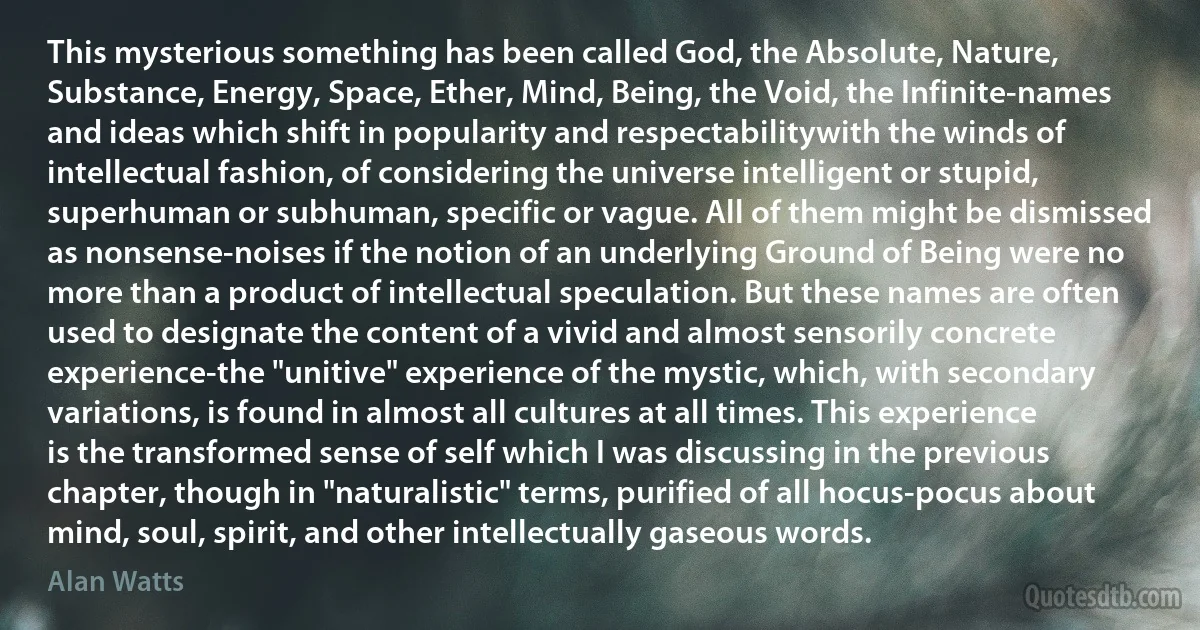
This mysterious something has been called God, the Absolute, Nature, Substance, Energy, Space, Ether, Mind, Being, the Void, the Infinite-names and ideas which shift in popularity and respectabilitywith the winds of intellectual fashion, of considering the universe intelligent or stupid, superhuman or subhuman, specific or vague. All of them might be dismissed as nonsense-noises if the notion of an underlying Ground of Being were no more than a product of intellectual speculation. But these names are often used to designate the content of a vivid and almost sensorily concrete experience-the "unitive" experience of the mystic, which, with secondary variations, is found in almost all cultures at all times. This experience is the transformed sense of self which I was discussing in the previous chapter, though in "naturalistic" terms, purified of all hocus-pocus about mind, soul, spirit, and other intellectually gaseous words.
Alan WattsRelated topics
almost concrete considering content ether experience fashion found ground intellectual might mind mystic nature secondary self sense something soul space specific speculation spirit stupid superhuman times vague vivid words names subhumanRelated quotes
From what can "ought" be derived. The most compelling answer is this: ethics must be somehow based on an appreciation of human nature - on a sense of what a human being is or might be, and on what a human being might want to have or want to be. If that is naturalism, then naturalism is no fallacy. No one could seriously deny that ethics is responsive to such facts about human nature. We may just disagree about where to look for the most compelling facts about human nature -n novels, in religious texts, in psychological experiments, in biological or anthropological investigations. The fallacy is not naturalism but, rather, any simple-minded attempt to rush from facts to values. In other words, the fallacy is greedy reductionism of values to facts, rather than reductionism considered more circumspectly, as the attempt to unify our world-view so that out ethical principles don't clash irrationally with the way the world is.

Daniel Dennett
As in the case of the individual, not all the information which is available to the race at one time is accessible without special effort. There is a well-known tendency of libraries to become clogged by their own volume; of the sciences to develop such a degree of specialization that the expert is often illiterate outside his own minute specialty. Dr. Vannevar Bush has suggested the use of mechanical aids for the searching through vast bodies of material. These probably have their uses, but they are limited by the impossibility of classifying a book under an unfamiliar heading unless some particular person has already recognized the relevance of that heading for that particular book. In the case where two subjects have the same technique and intellectual content but belong to widely separated fields, this still requires some individual with an almost Leibnizian catholicity of interest.

Norbert Wiener
Let your self go. If you can approach the world's complexities, both its glories and its horrors, with an attitude of humble curiosity, acknowledging that however deeply you have seen, you have only scratched the surface, you will find worlds within worlds, beauties you could not heretofore imagine, and your own mundane preoccupations will shrink to proper size, not all that important in the greater scheme of things.' Keeping that awestruck vision of the world ready to hand while dealing with the demands of daily living is no easy exercise, but it is definitely worth the effort, for if you can stay centered, and engaged, you will find the hard choices easier, the right words will come to you when you need them, and you will be a better person. That, I propose, is the secret to spirituality, and it has nothing at all to do with believing in an immortal soul, or in anything supernatural.

Daniel Dennett
The impression that infra-human mammals more or less confine themselves to heterosexual activities is a distortion of the fact which appears to have originated in a man-made philosophy, rather than in specific observations of mammalian behavior. Biologists and psychologists who have accepted the doctrine that the only natural function of sex is reproduction, have simply ignored the existence of sexual activity which is not reproductive. They have assumed that heterosexual responses are a part of an animal's innate, "instinctive" equipment, and that all other types of sexual activity represent "perversions" of the "normal instincts". Such interpretations are, however, mystical. They do not originate in our knowledge of the physiology of sexual response (Chapter 15), and can be maintained only if one assumes that sexual function is in some fashion divorced from the physiologic processes which control other functions of the animal body.

Alfred Kinsey
With... small-town life... there are hundreds of thousands... who are not content. The more intelligent young people... flee to the cities... and... stay there, seldom returning even for holidays. The reason, Carol insisted... is an unimaginatively standardized background, a sluggishness of speech and manners, a rigid ruling of the spirit by the desire to appear respectable. It is contentment... the contentment of the quiet dead, who are scornful of the living for their restless walking. It is the prohibition of happiness. It is the slavery self-sought and self-defended. It is dullness made God. A savorless people, gulping tasteless food and sitting afterward, coatless and thoughtless, in rocking-chairs prickly with inane decorations, listening to mechanical music, saying mechanical things about the excellence of Ford automobiles, and viewing themselves as the greatest race in the world.

Sinclair Lewis
